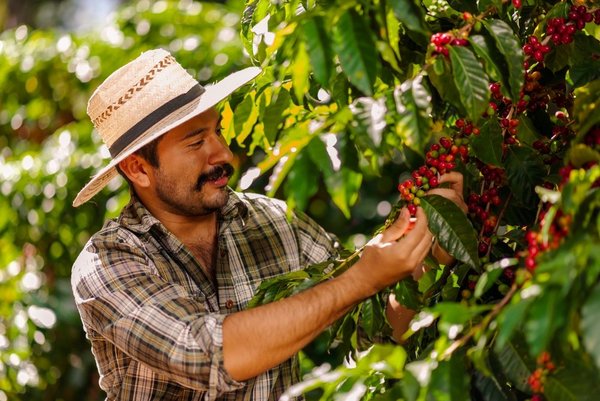 Read this article in French
Read this article in French- Share this article
- Subscribe to our newsletter
Arabica coffee – a new database to better identify more climate-resilient plants
While more than 120 species of coffee exist, around 70 per cent of the world's coffee production is arabica. However, arabica has a lower tolerance to rising temperatures and is more susceptible to disease than other coffee plants, such as Robusta.
Additionally, climate change is reducing the amount of arable land it is possible to cultivate coffee on, and water shortages are significantly reducing yields.
To help ensure a sustainable future for coffee cultivation and support farmer livelihoods, Nestlé plant scientists, in cooperation with an international team of researchers, are exploring new, higher yielding arabica varieties with greater resistance to disease and drought.
Development of a high quality reference genome – available at a digital database
As part of this work, the experts have developed a very high quality arabica reference genome using advanced data science methods. The reference genome, which is available in a publicly available digital database, makes it easier to analyse different traits of coffee varieties to identify specific ones such as better yield, coffee cherry size and greater resilience to disease or drought, as well as flavour or aroma characteristics.
The reference genome represents a significant advancement in the field of plant research. The innovative work was recently published in the scientific journal Nature Genetics.
“Once the new genome had been sequenced, it had to go through a process called annotation,” says Dr Jan Engelhardt of the University of Vienna in Austria, and co-author of the study. “For example, this involves identifying regions that contain information about the production of messenger RNAs. These ribonucleic acid molecules can essentially be translated into proteins.”
But there are also “non-coding RNAs”, which have important functions in the regulation and coordination of every cell. “That is our specialty,” adds Professor Peter Florian Stadler of Germany’s University of Leipzig. “Working with our international colleagues, our group identified genomic regions that represent non-coding RNAs.”
Jeroen Dijkman, Head of Nestlé's Institute of Agricultural Sciences, maintains: "In simple terms, our new reference is like a high-quality map of a big city. It will help us identify key genetic markers in the arabica genome that are responsible for specific traits in adult plants. This will help our plant scientists and other experts to better identify, select and breed new and improved arabica coffee varieties."
Patrick Descombes, Senior Expert in Genomics at Nestlé Research, and also one of the paper's co-authors, says: "While other public references for arabica do exist, the quality of our team's work is extremely high. We used state-of-the-art genomics approaches – including long and short reads high throughput sequencing – to create an advanced, complete and continuous arabica reference."
This work was co-directed with the French National Institute for Sustainable Development (IRD) and consists of collaborative efforts with several academic partners as part of a global consortium. The latter include Nanyang Technological University, Singapore, the University of São Paulo, Brazil, the University at Buffalo, USA, the National Agricultural Research Organization (NARO) in Uganda, the University of Helsinki, Finland, the University of Leipzig, Germany, Boyce Thompson Institute and Cornell University, USA, and VIB-UGent Center for Plant Systems Biology, Belgium.
(Nestlé/University of Leipzig/wi)
Reference:
Jarkko Salojärvi, Parick Descombes et al.: “The genome and population genomics of allopolyploid Coffea arabica reveal the diversification history of modern coffee cultivars”. Nature genetics, April 2024; DOI: 10.1038/s41588-024-01695-w





Add a comment
Comments :
I surprise how much attmpt you put to make any suxh great
informative website. https://www.waste-ndc.pro/community/profile/tressa79906983/